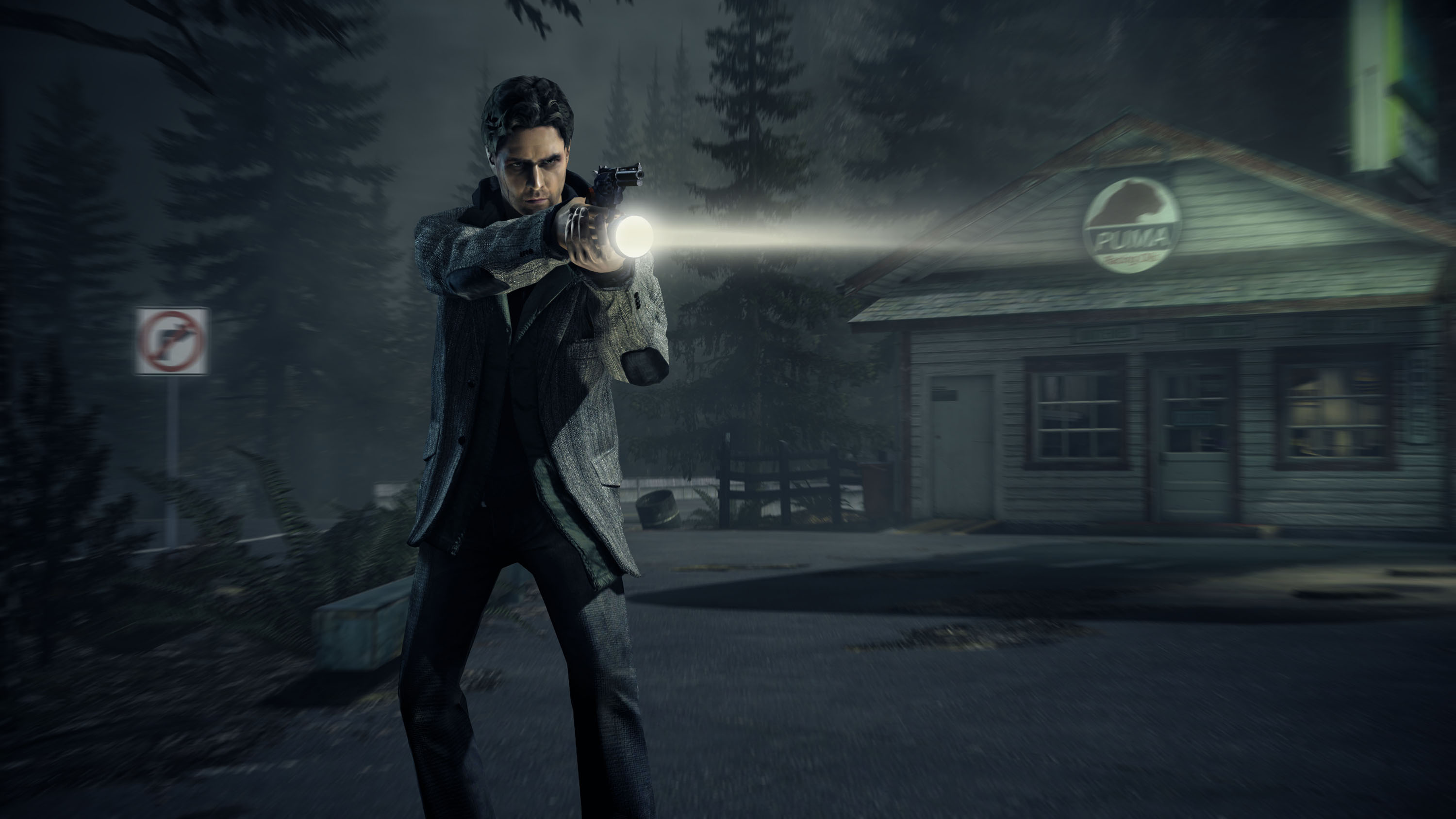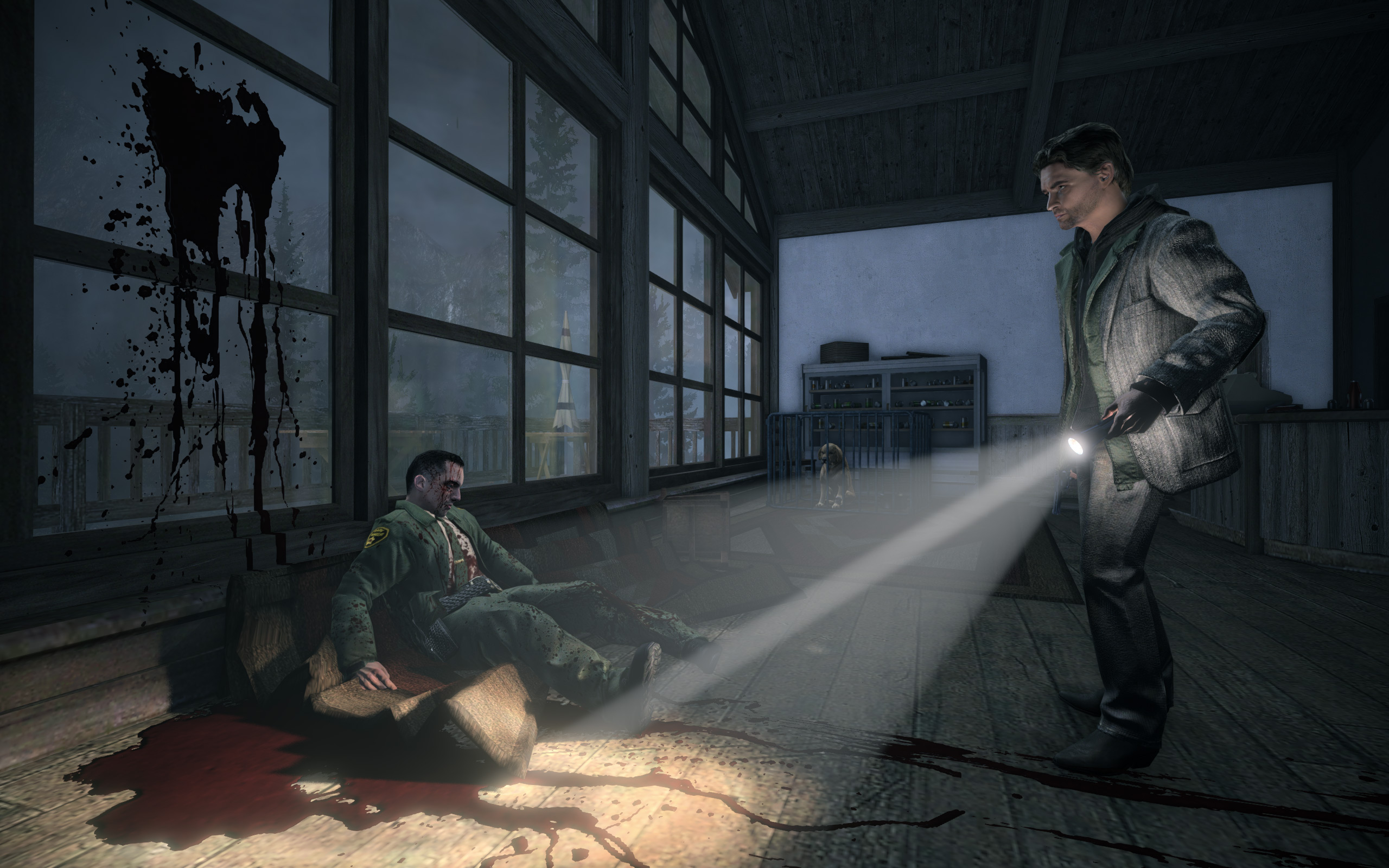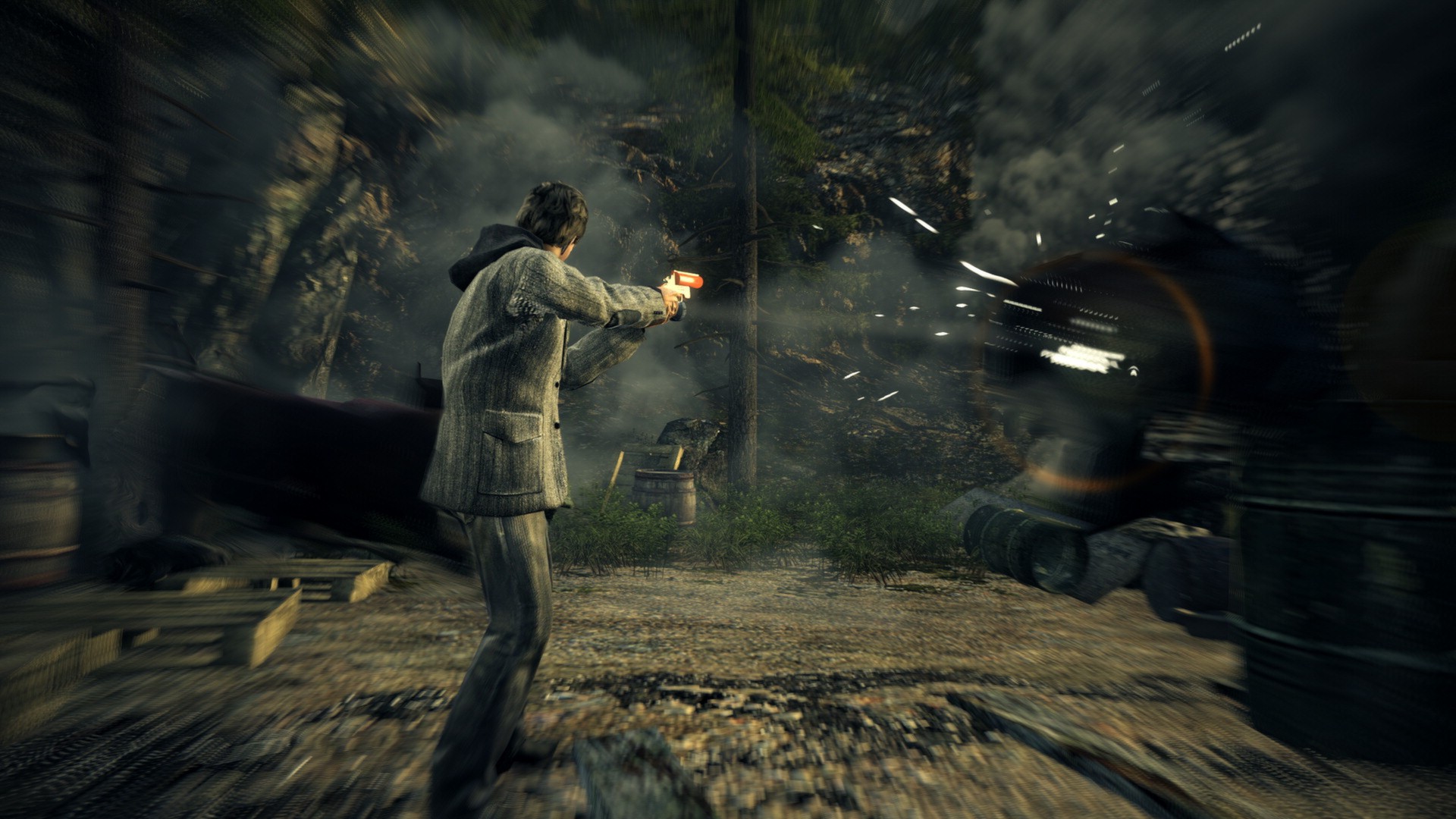
Game Info:
Alan Wake
Publisher: Microsoft Game Studios
Developer: Remedy Entertainment
Released: May 18, 2010
ESRB Rating: Teen for Blood, Language, Use of Alcohol and Tobacco, Violence
Available on: Xbox 360
Genre: Action/Adventure
MSRP: $29.99
(Click here to jump to the moral content)
In 1985, Stephen King admitted his reluctance to publish his 1983 novel Pet Semetary, saying, “I don’t like it. It’s a terrible book … it just spirals down into darkness.” Reading the book revealed a story that told of abject horror, because its themes grappled with love and death, dealing with the nature of grief and mourning. It is not a happy or light book, in other words, but it’s still plenty gripping.
Alan Wake, developed by Remedy Entertainment (the acclaimed Finland-based developers of the Max Payne series), finds its inspiration in not only King’s novels, but also King himself. And like Pet Semetary, Alan Wake spirals into darkness. The story is one of insanity and obsession, and there aren’t any easy answers here, nor should there be. Horror is terrifying because of what isn’t said, not because of the obvious. Sure enough, Remedy’s game leaves a lot of things unanswered, and that’s exactly the way they wanted it. Like the horror novels that it takes its inspiration from (as well as TV shows, like Lost and Twin Peaks), Alan Wake is a game that leaves more questions than it solves, resolving things with an ending that is more opaque than anything else.
Alan Wake (the character) is an author of thrillers, in the vein of King but far more pulpy. His novels are best-sellers and he has a devoted fanbase, but there’s a problem: he hasn’t written a word for two years, and actually sitting down and trying to write anything gives Wake terrible, crippling headaches. He and his wife have escaped to Bright Falls, WA, a small town nestled in the forest, in the hopes of curing Wake’s crippling writer’s block.

So when Wake finds himself sitting one week later in a crashed car, with a gash on his head, his wife missing and a completed manuscript scattered throughout the woods, he’s understandably upset. Even more worrisome are the dark shapes moving through the trees. Things shout at him from the distance, laughing, and Wake has no gun. Just a flashlight.
From here, the game just goes crazy. It’s a typical third-person shooter in many respects, and like previous Remedy games, it uses a central mechanic that drives the game. In Max Payne, the slow-motion “Bullet Time” effect gave players a tactical advantage, and made killing bad guys look cool. Alan Wake, on the other hand, arms players with a flashlight; the evil in the forest can’t be defeated by normal means, at least, not initially. Instead, shining a burst of light on any enemy will weaken them, allowing a basic range of weaponry (pistols and shotguns, plus the occasional flare gun) to do damage to enemies. And flare guns? They’re basically the game’s really cool, overpowered rocket launcher, and they’re in short supply (compared to the other guns).
Much of the game, then, is spent wandering through the woods armed with a flashlight and a pistol, and hoping against hope that that isn’t a chainsaw that you hear revving over the ridge. All of that wandering might be a problem – and characterized by the slightly one dimensional action and (bordering on) dull scenery – but the inky blackness that envelops the woods looks great, especially with the slightly heavy contrast applied to the game’s visuals. In fact, the only place that the visuals falter even in the slightest is during the day. Things don’t look quite as good then, and it’s because there isn’t this dark visual filter flowing through and over everything, muddying things and making them look downright impressive.

Score Breakdown:
Higher is better
(10/10 is perfect)
Game Score - 86%
Gameplay - 15/20
Graphics - 8/10
Sound - 10/10
Stability - 5/5
Controls - 5/5
Morality Score - 70%
Violence - 6/10
Language - 5/10
Sexual Content - 8/10
Occult Supernatural - 8/10
Cultural/Moral/Ethical - 8/10
You don’t see much of the day, however; the majority of Alan Wake takes place during the dead of night. Day sequences occur occasionally to progress the story further, and most of these take their cues from adventure games, focusing more on conversation and exposition, as opposed to action. Their brevity is notable because they, like any instance of light in the game, serve as a respite from the danger of the night and the woods.
The action does get a little tired over the course of the game, because there’s not much variety, and encounters boil down to the same formula each and every time. Seeing slow motion shots of enemies walking onto the scene, weapons in their hands, is pretty cool the first two or three times, but it eventually does nothing but interrupt the game. And when that consistently happens each and every battle, things get a little tired. The shooting action is very similar in that regard; every enemy in the game can be defeated in exactly the same manner. The very few boss encounters do nothing but increase the amount of damage taken, but they’re pretty much exactly the same otherwise. For any game, especially one that runs ten to twelve hours, this isn’t a good quality to have.
Fortunately, the rest of Alan Wake is engrossing, even if the minute-to-minute action can get a bit played out. Part of this is due to the tight pacing of the plot, which is styled in an episodic format. Each episode begins with a recap of the events of the previous installment, before plunging players into the game again. These opening moments, even when in the final act of the game, tend to start off slowly, and then build to a natural climax, often ending in a cliffhanger.
The other reason is that, well, Alan Wake is a very well written game. Its writing is intentionally cheesy, designed to emulate some of the writers that Wake is supposed to model. Nevertheless, the plot consistently has this “gotta see what happens next” vibe to it, and the ease of play (not referring to overall difficulty of the game) helps matters quite a bit. In fact, were it not for the stunning lack of variety in combat, Alan Wake would be one of the better third-person shooters of this generation, based on the merits of how it plays alone. As it stands, things just don’t progress much past that; really, that’s one of the few faults I find here, and one of the things that keeps Alan Wake from hitting the relative highs that the rest of the year’s best releases did.
The few clumsy pieces of dialogue – lines that do nothing for the story, and the middling-to-mild bits of profanity that occasionally dot the tale – don’t necessarily take away from the telling or playing of the game. And Alan Wake is, ultimately, a smart game: A game that is designed to be played and enjoyed and thought over. Its graphics stumble in some areas and shine in others, as does the voicework and the writing. It is not perfect. It is far from perfect.
It is, however, gorgeous and brilliant, and despite its rough patches, it’s a game that can instantly be recommended to anyone with a love of twisting yarns or action games with a slightly scary bent. Alan Wake’s terror is not in what it shows you, but in what it doesn’t show you. Remedy has succeeded on that front, and everything else just adds to the experience.
Objectionable Content
Violence: Alan Wake is a third-person shooter. Throughout the game, the player will find themselves being constantly attacked by what seems to be preternatural forces, taking control of the townsfolk. These are dispatched with a flashlight and a gun, and this does comprise much of the gameplay. However, barring some sequences framing a cut on Alan Wake's forehead, the violence is all bloodless.
Language: While Alan Wake isn't the most profane game on the market, there's still a good amount of cursing present. This is mostly what you'd see in a PG-13 movie, with "d***" and "s***" taking the center stage. A couple of characters also use "godd***," which strikes me as a bit unnecessary.
Sexual Content/Nudity: The beginning of the game features Wake's wife in a tank top and underwear. Nothing sexual occurs.
Occult/Supernatural: The ultimate enemy of Alan Wake is, certainly, some sort of supernatural force. It takes control of the townsfolk and tries to consume Alan Wake. The game doesn't define just what the creature is that takes control of the town, but there are no hints that it is in any way demonic.
Cultural/Moral/Ethical: At one point in the story, Wake finds himself running from the police. This is a small plot point, and the character in charge of the police is not painted by any character, including the small town cops, as anything but evil.










